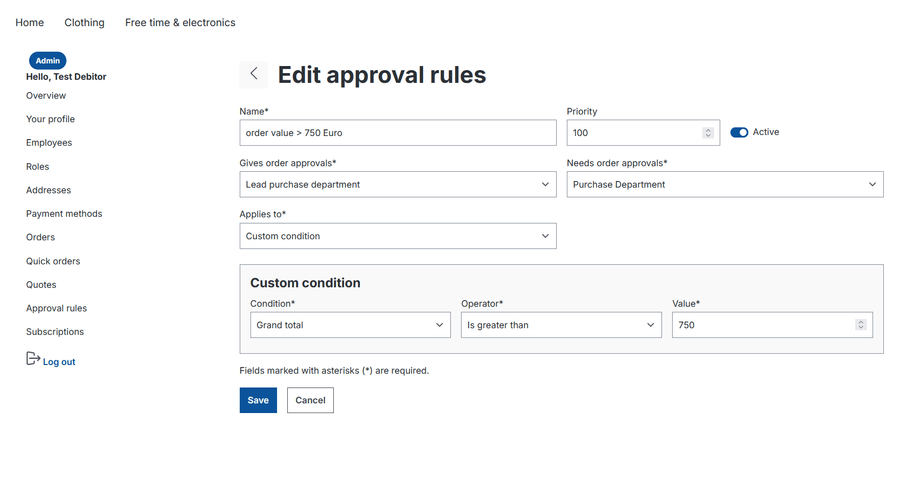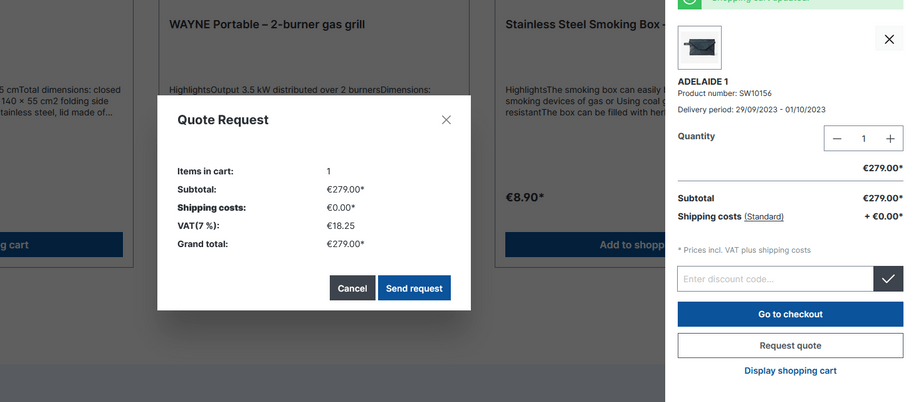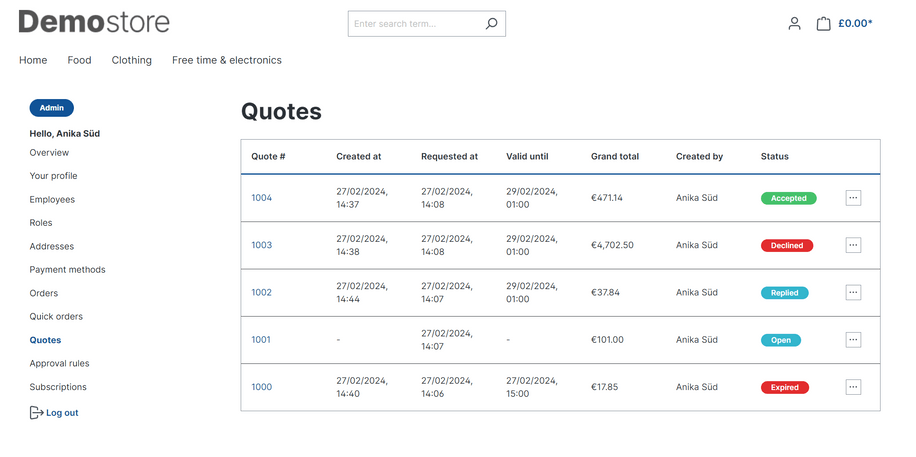Essential eCommerce features to optimize complex B2B processes (from Shopware)

When managing B2B sales, traditional methods like phone or email orders might feel familiar, but they aren’t designed to handle the complexity of modern business relationships.
If you’re considering creating a sales platform to replace these outdated methods, Shopware eCommerce provides a range of features specifically designed to simplify this transition and meet the unique demands of business-to-business transactions.
In this post, we’ll take a closer look at the key functionalities for successful ecommerce while introducing “B2B Components” and the benefits of the free “Community Edition”. It’s all about giving you clear insights to make informed decisions.
Ready to see what Shopware offers for businesses like yours? Let’s unpack what you need to know.
Why digital transformation matters for B2B sales
Let’s start with the big picture. In a B2B setup, the stakes are high – your clients often expect custom pricing, access to product availability, and tailored service. Managing all of this manually via emails or calls? It’s time-consuming, inconsistent, and can’t scale.
And as your client base grows, the manual workload becomes unmanageable…
What if you could connect with your business customers more effectively than ever before? Switching to an ecommerce platform like Shopware gives these benefits:
- Customer convenience: Self-service options make it easier for sales representatives to do business with you – they can self-manage their accounts, track orders, and download invoices independently.
- Scalability: A digital platform can grow with your business, supporting larger operations and customers.
- Efficiency: B2B e-commerce platform can directly improve your day-to-day and optimize complex operations.
- Automation: E-commerce with essential B2B functionalities reduces human errors and dependency on your sales team for routine tasks.
B2B capabilities every eCommerce needs
Have you ever wondered how much easier managing your operations could be with the right tools?
Shopware offers robust functionality for a B2B platform. These features make it easier to meet the complex demands of business clients while ensuring a seamless buying process. Key features include:
1. Approval workflows
B2B clients operate in complex hierarchies where purchasing authority varies.
Order approval workflows are automated steps that make sure certain approvals are given before finalizing an order. You can configure them to include multiple approval levels.
Why are they important in B2B?
Control over spending:
Businesses buying from you may have internal policies requiring purchase approvals from managers or procurement teams. Order approvals ensure these policies are followed without manual intervention.
Reduced errors and fraud:
With an approval process in place, businesses can control their procurement better, avoid unapproved buying, cut down errors, and safeguard accounts from fraud or misuse.
Efficient management of large orders:
High-value or large orders often require extra attention to stay within budget and meet operational needs. Approval workflows streamline this process, minimizing chances of miscommunication. No more endless email chains.
Example use case
Imagine a company purchasing office supplies from your platform. A department employee initiates an order, but it exceeds their $10,000 spending limit. The workflow automatically forwards the order to their manager for approval. Once approved, the order proceeds to fulfillment.

(Source: Shopware)
2. Quotation system
Unlike B2C transactions, where prices are often fixed and publicly visible, business buyers tend to negotiate deals and ask for quotes. To manage discounts or custom terms efficiently, sellers look for e-commerce solutions that can handle this easily.

(Source: Shopware)
With Shopware, all quote-related interactions happen within the platform. The client reviews the quote and, if satisfied, can approve it.
Why is it important in B2B?
Streamlined negotiations:
Without quote management, sales teams often rely on spreadsheets, emails, or phone calls to negotiate prices, leading to delays. Moreover, B2B transactions often involve multiple decision-makers and lengthy approval processes. Shopware solutions speed up the negotiation process.
Transparency:
With quotes managed in a single platform, businesses can track the status of negotiations in real time. There is a clear record of every negotiation step and all pricing details are formalized which help build trust between buyers and sellers.

(Source: Shopware)
3. Role-based access control
With role-based access control from Shopware, you can define clear boundaries for user actions.
Simply assign roles like "Buyer," "Approver," "Manager," or "Administrator," and give each role the permissions they need for their tasks.
For example:
- Orders placed by a junior buyer are routed to a manager for approval before it’s processed.
- Finance teams can access invoices and payment details without viewing sensitive product data.
- Administrators can oversee all activities but are blocked from accessing payment history or invoices.
Why is it important in B2B?
Improved security:
Imagine a scenario where every team member at the organization has unrestricted access to sensitive data.
Lack of proper employee management exposes businesses to mistakes, inefficiencies, and security threats. Using Shopware’s features, the right people have access to the right features, protecting both you and your clients from risks.
Scalability:
Shopware keeps accounts well-organized as your clients expand and bring on more users.
4. Individual pricing
Whether you're managing a few key accounts or a large portfolio of customers, Shopware’s custom pricing tools ensure you can offer competitive, transparent, and adaptable pricing models based on factors like order volume, long-term agreements, or unique product configurations.
Why is it important in B2B?
Competitive advantage:
Offering personalized pricing to specific customers or groups can set you apart in a competitive market. It enables you to win key accounts by meeting their specific needs while maintaining profitability.
Tailored client relationships:
Shopware simplifies the management of complex pricing agreements, making it flexible.
In B2B, every customer is different. A buyer with a long-term contract doesn't expect the same pricing as a small business ordering occasionally. Shopware also can support lower rates for large orders, rewarding customers who buy in bulk (volume-based pricing rules).
It’s not just about numbers – it’s about creating a personalized, professional experience that builds loyalty. Custom pricing strengthens relationships by reflecting the unique value each client brings.
Flexibility in dynamic markets:
In industries where costs fluctuate (e.g., raw materials or logistics), Shopware's custom pricing helps businesses update prices in response to market changes without renegotiating every detail from scratch.
Companies operating in multiple regions also may need to account for variations in costs, taxes, and local competition, making a single-price model ineffective. Shopware reduces errors caused by manual price calculations.
5. Quick ordering and order lists
Companies selling to retailers or wholesalers often have performance issues. Shopware B2B offers:
- Quick ordering functionality: It allows customers to input product codes and quantities to add items to their cart directly or upload a file with SKUs
- Shopping list: Customers can save frequently purchased items into categorized lists (e.g., "Monthly supplies" or "Seasonal stock"). These lists can be reused, adjusted, or shared across the client's organization.
Why are they important in B2B?
Handling time-sensitive orders:
A distributor running low on stock may need to restock quickly to meet client demand. Quick orders allow them to place orders in minutes, avoiding delays that could affect their operations.
Time-saving for repeat orders:
Many B2B clients reorder the same items regularly. Shopping lists allow them to save frequently purchased products, reducing the need to re-enter information every time they shop.
Bulk ordering efficiency:
B2B customers frequently place large orders with multiple items. Manually searching for products or adding them one by one to a cart is inefficient and error-prone. Quick orders enable bulk purchases in seconds.
Minimized errors in complex orders:
For businesses dealing with hundreds of SKUs, manually adding items can lead to errors that disrupt supply chains. Quick orders and Shopping lists powered by Shopware ensure accuracy by automating this process.
6. ERP and CRM integrations
For most B2B companies, ERP and CRM systems are already in place before adopting an eCommerce platform.
They are the backbone of B2B operations: ERP (Enterprise Resource Planning) systems manage inventory, order processing, and logistics, while CRM (Customer Relationship Management) systems handle customer data, communication history, and lead tracking.
For eCommerce to be successful, it needs to integrate seamlessly with other tools, forming a connected, unified ecosystem. You may ask why this matters so much.
For example, a delay in syncing inventory data between your ERP and eCommerce platform could lead to overselling, causing customer dissatisfaction. Similarly, if your CRM doesn’t communicate with your eCommerce system, sales reps might miss critical client updates, jeopardizing relationships.
Shopware’s open APIs allow easy integration with popular ERP and CRM systems like SAP, Microsoft Dynamics, and Salesforce. You’ll also find plenty of pre-built connectors, and for unique setups, Shopware supports custom integrations, enabling businesses to align the platform with their specific needs.
Why are they important in B2B?
Real-time data sync:
Whether it’s an inventory update in the ERP or a new client lead captured in the CRM, Shopware ensures all data is synchronized in real time across all systems. Businesses can centralize their operations
Struggling with B2B eCommerce complexity? See how Shopware can make it simpler.
Shopware’s B2B Components
Shopware is packed with strong capabilities for creating B2B platforms. With Shopware's B2B Components, your store can have all the key functions needed for B2B sales. These tools are built to be flexible and modular, making them easy to customize.
When to choose B2B Components? If you want to design your platform exactly how you want it by mixing and matching individual features into your B2B eCommerce.
* Another option is the B2B Suite, a pre-configured solution that's ready to use with minimal setup. But keep in mind, Shopware doesn’t plan to expand the B2B Suite with new features. Future improvements and innovations will be added to the B2B Components instead.
Which plans include these solutions?
B2B Components are available in Shopware’s Evolve and Beyond plans.
It’s worth reviewing Shopware pricing and plan breakdowns to ensure you choose the right fit for your business. Refer to Shopware's official website for the most current information.
Shopware Community Edition: A strong alternative
Not every business needs to start with a paid plan. The Community Edition is a versatile e-commerce platform that serves as a strong foundation for businesses looking to enter the B2B market without the upfront cost of paid plans.
Pair it with the right customizations, and you may find it meets your unique operational needs – especially if you work with an experienced Shopware partner. In many cases, its flexibility and custom potential make it more than enough to support your B2B ambitions.
Additionally, the open-source nature of the platform means there is access to a vast ecosystem of plugins and extensions in comparison to some of its competitors (many of which are free or low-cost). These plugins can add functionality such as SEO tools, or product configuration, significantly enhancing the platform’s capabilities.
For businesses with complex workflows or niche requirements, a development partner can build custom integrations or features, ensuring the platform works exactly as needed.
Who should consider Shopware for B2B?
If your business relies on high-value or repeat transactions, or you have clients with complex procurement needs, Shopware solutions allow you to build a flexible and feature-rich sales platform.
Ideal industries include:
- Manufacturing,
- Wholesale,
- Distribution,
- Professional services.
Interested in B2B e-commerce built with Shopware? Check out the cases we’ve worked on:
Next steps: Is Shopware eCommerce the upgrade you need
Here’s what you can do today:
- Identify your needs: What features do you prioritize the most? Map out the features you require for your B2B store, such as custom checkout or role management.
- Choose the right option: Browse through the plans and select whether the free version or a paid plan is right for your present and future goals.
- Consult the experts: Get in touch with Shopware implementation partner to set up and customize your platform.
Contact us for a personalized consultation or request a demo to see how Shopware can streamline your complex B2B processes.
Many businesses struggle silently with manual processes that no longer serve their needs. Don’t wait for inefficiencies to pile up. Shopware understands the complexities of B2B sales and offers a much-needed simplification – from their free ecommerce solution to their advanced paid plans, they cater to all kinds of users and needs. The features it provides can transform how you interact with your clients, replacing outdated processes with a streamlined, professional e-commerce platform.






